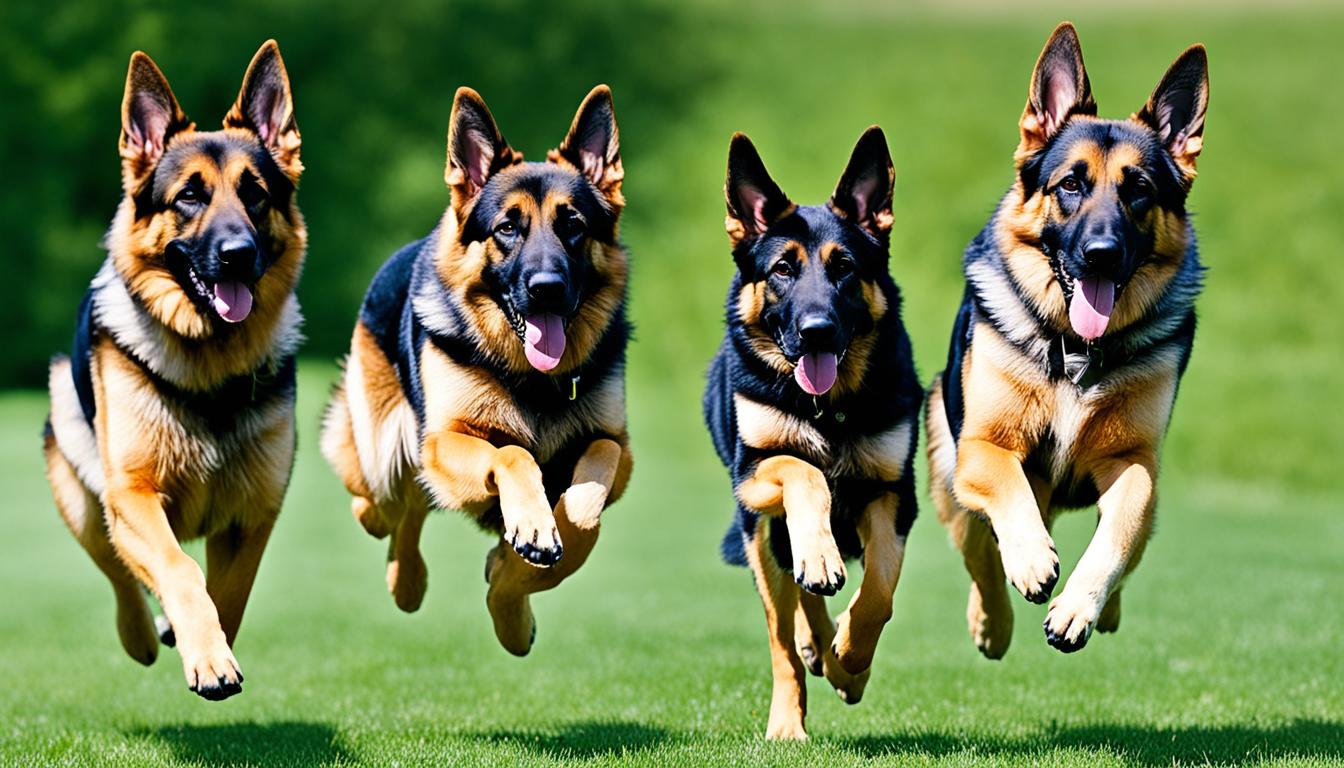German Shepherd Lifespan: What You Need to Know
German Shepherds are beloved companions known for their loyalty and intelligence. As the second most popular breed in the United States, many dog lovers are curious about German Shepherd life expectancy. We’ll explore the factors that influence their lifespan and discuss key German Shepherd breed traits that impact their health.
The average German Shepherd life expectancy ranges from 9 to 13 years. This can vary based on genetics, diet, exercise, and preventive care. The American Kennel Club (AKC) reports a slightly shorter range of 7 to 10 years. Understanding these factors can help owners take steps to support their dog’s longevity and overall German Shepherd health.
German Shepherds face unique health challenges due to their size and breed characteristics. Common issues include hip dysplasia, arthritis, and bloat. By being aware of these potential problems, owners can work with veterinarians to implement preventive measures and early interventions when necessary.
Key Takeaways
- German Shepherds typically live 9-13 years
- Diet, exercise, and preventive care impact lifespan
- Regular vet check-ups are crucial for early detection of health issues
- Proper nutrition and weight management support longevity
- Responsible breeding practices help prevent genetic health problems
- Daily exercise is essential for maintaining optimal health
What is the lifespan of a German Shepherd?
German Shepherd lifespan is a topic of interest for many dog lovers. These loyal companions typically live between 9 to 13 years. Let’s dive into the details of their life expectancy and explore factors that can influence their longevity.
Average life expectancy
The American Kennel Club (AKC) reports that German Shepherds have an average life expectancy of 7 to 10 years. This puts them in line with other large dog breeds. It’s worth noting that with proper care, many German Shepherds surpass this range.
Factors influencing lifespan
Several factors affect dog lifespan, particularly for German Shepherds. Genetics play a crucial role, as does nutrition. A lean diet can add up to 2 years to a dog’s life. Regular exercise is vital, with the AKC recommending at least two hours daily for optimal health. Spaying or neutering can increase life expectancy by 13.8% for males and 26.3% for females.
Comparison to other large dog breeds
When comparing the German Shepherd lifespan to other large dog breeds, they fall within a similar range. Great Danes, for example, typically live between 7 to 10 years. Smaller breeds often enjoy longer lifespans, with some reaching 12 years or more. The key to longevity lies in proper care, regular vet check-ups, and addressing breed-specific health concerns.
| Breed | Average Lifespan |
|---|---|
| German Shepherd | 9-13 years |
| Great Dane | 7-10 years |
| Jack Russell Terrier | 12-14 years |
Understanding German Shepherd Breed Traits
German Shepherd characteristics make them one of the most popular dog breeds in the United States. Ranking third in popularity, these intelligent canines are known for their versatility and exceptional abilities. Their German Shepherd temperament shines in roles like police work, search and rescue, and service dog duties.
The German Shepherd personality is marked by loyalty, protectiveness, and high energy levels. These dogs require ample exercise to stay happy and healthy. A minimum of two hours of daily activity, including walks and play sessions, is crucial for their well-being.

German Shepherds are not just physically active; they’re mental powerhouses too. Ranked as the third most intelligent dog breed, they excel in training and problem-solving tasks. This combination of brains and brawn makes them ideal companions for active families or individuals seeking a devoted and capable canine partner.
| Trait | Description |
|---|---|
| Size | Males: 24-26 inches, 65-90 lbs Females: 22-24 inches, 50-70 lbs |
| Lifespan | 9-13 years |
| Exercise Needs | High (2+ hours daily) |
| Intelligence Ranking | 3rd among all dog breeds |
| Coat Type | Double coat, various colors |
While German Shepherds are remarkable dogs, they’re not without health concerns. About 20% of the breed is prone to hip and elbow dysplasia. Regular veterinary check-ups, proper nutrition, and maintaining a healthy weight are essential for their longevity and quality of life.
Common Health Issues Affecting German Shepherd Longevity
German Shepherd health problems can significantly impact their lifespan. We’ll explore some of the most prevalent issues that may affect these loyal companions.
Hip Dysplasia
Hip dysplasia in German Shepherds is a common concern. This genetic condition affects about 20% of the breed, according to the Orthopedic Foundation of Animals. It occurs when the hip joint doesn’t develop properly, leading to pain and reduced mobility.
Arthritis
Canine arthritis often develops as German Shepherds age. This painful condition affects the joints, making movement difficult. Regular exercise and weight management can help alleviate symptoms and slow progression.
Bloat (Gastric Dilatation Volvulus)
Bloat, or Gastric Dilatation Volvulus (GDV), is a life-threatening condition in German Shepherds. It occurs when the stomach fills with gas and twists on itself. The mortality rate for GDV can reach 25 to 30%, making quick veterinary intervention crucial.
| Health Issue | Prevalence | Impact on Longevity |
|---|---|---|
| Hip Dysplasia | 20% | Moderate to Severe |
| Arthritis | Common in older dogs | Moderate |
| Bloat (GDV) | Higher risk in large breeds | Severe (potentially fatal) |
Regular veterinary check-ups and proper care can help detect these issues early, improving the overall quality of life and longevity of German Shepherds.
Nutrition and Diet for a Longer-Living German Shepherd
A well-balanced German Shepherd diet is crucial for maintaining optimal health and extending their lifespan. We’ll explore the key aspects of dog nutrition that contribute to the well-being of these loyal companions.
Importance of High-Quality Dog Food
Choosing the right food is essential for your German Shepherd’s health. Look for dog food with meat as the primary ingredient, avoiding options with corn, animal by-products, or artificial additives. High-quality protein sources support muscle development and overall vitality.

Proper Feeding Schedule
Establishing a consistent feeding routine is vital for weight management for dogs. We recommend dividing daily meals into smaller portions to prevent bloat, a common issue in German Shepherds. Adjust caloric intake based on age and activity level:
- Active adults: 1,740-2,100 calories per day
- Inactive seniors: 1,272-1,540 calories daily
Weight Management
Maintaining a healthy weight is crucial for German Shepherds. Obesity can lead to various health problems, including diabetes and joint issues. Regular exercise, portion control, and a balanced diet are key factors in weight management for dogs. Proper weight control can increase life expectancy by up to two years.
| Age Group | Daily Calorie Intake | Meals per Day |
|---|---|---|
| Puppies (2-6 months) | 1,500-1,800 | 3-4 |
| Adults (1-7 years) | 1,740-2,100 | 2-3 |
| Seniors (8+ years) | 1,272-1,540 | 2-3 |
By focusing on these aspects of German Shepherd diet and nutrition, we can help our furry friends lead longer, healthier lives. Remember to consult with a veterinarian to tailor a diet plan that suits your dog’s specific needs.
Exercise and Activity: Keys to German Shepherd Health
German Shepherds are active dogs with high energy levels. Meeting their exercise needs is crucial for their overall health and longevity. We recommend providing at least 1.5 to 2 hours of daily physical activity to keep your German Shepherd fit and happy.
A well-exercised German Shepherd is less likely to develop obesity, which can lead to various health issues. Regular dog physical activity helps maintain a healthy weight, with adult males typically weighing between 65-90 pounds and females between 50-70 pounds.
Balancing Exercise and Rest
While exercise is essential, it’s important to balance activity with rest. Overexertion can lead to joint problems, especially in a breed prone to hip dysplasia. We suggest splitting exercise into two or more sessions throughout the day to prevent strain.
Canine fitness for German Shepherds should include a mix of activities:
- Daily walks or jogs
- Fetch or frisbee games
- Swimming (low-impact exercise)
- Agility training
- Mental stimulation games
Remember, German Shepherds are intelligent dogs. Combining physical exercise with mental challenges keeps them engaged and prevents boredom-related behaviors. Puzzle toys or obedience training can provide this mental stimulation.
By meeting your German Shepherd’s exercise needs, you’re not just keeping them physically fit. You’re also strengthening your bond and contributing to their overall well-being and longevity.
Preventive Care and Regular Veterinary Check-ups
Proper German Shepherd veterinary care is crucial for maintaining your dog’s health and longevity. Regular check-ups help detect potential issues early, ensuring prompt treatment and better outcomes.
Importance of Annual Check-ups
We recommend yearly veterinary visits for healthy German Shepherds. These check-ups allow vets to monitor your dog’s overall health, address concerns, and provide necessary vaccinations. Senior dogs or those with pre-existing conditions may need more frequent visits.
Vaccinations and Parasite Prevention
Keeping your German Shepherd up-to-date on vaccinations protects against serious diseases like parvo, rabies, and distemper. Regular parasite prevention is equally important, guarding against heartworms, roundworms, and fleas. These measures are key components of effective dog preventive care.
Dental Care
Canine dental health is often overlooked but vital for German Shepherds. By age two, 80% of dogs show signs of dental disease. Daily tooth brushing, dental chews, and professional cleanings can significantly improve your dog’s oral health and overall well-being.
Remember, preventive care goes beyond vet visits. A balanced diet, regular exercise, and a safe living environment all contribute to your German Shepherd’s health and happiness. By prioritizing these aspects of care, you’re taking important steps to extend your furry friend’s lifespan.
Genetic Factors and Responsible Breeding
German Shepherd genetics play a crucial role in the health and longevity of these beloved dogs. We’ve found that responsible dog breeding practices are key to reducing hereditary health issues and ensuring purebred dog health. When selecting a German Shepherd, it’s vital to choose a reputable breeder who conducts thorough health testing on parent dogs.
Genetic factors significantly influence common health problems in German Shepherds, such as hip and elbow dysplasia. To combat these issues, the German Shepherd Association SV has implemented strict breeding standards. For instance, a female must be at least 20 months old before her first breeding, and there are limits on the number of times a dog can be bred.
The SV’s commitment to responsible breeding is evident in their extensive registration system. With over 2 million dogs registered in their stud book and about 10,000 puppies added annually, they maintain a robust genetic pool. This careful management helps preserve the breed’s health and characteristics.
| Aspect | Details |
|---|---|
| Annual Registrations | 10,000 puppies |
| Total Registered | Over 2 million |
| Minimum Breeding Age | 20 months |
| DNA Analysis | Generatio Sol. GmbH, Heidelberg |
To ensure purebred dog health, the SV employs DNA analysis for genetic pedigree guarantees. This scientific approach, combined with responsible breeding practices, helps maintain the German Shepherd’s renowned intelligence and physical capabilities while working to reduce genetic health issues.
Tips for Extending Your German Shepherd’s Life
We can significantly increase our German Shepherd’s lifespan through proper care and attention. Weight management is crucial for longevity. Studies show that overweight dogs face a higher risk of premature death. For German Shepherds, females over 80lbs and males over 105lbs are likely overweight, regardless of height. Keeping our dogs lean can add up to 25% to their lifespan.
Regular vet check-ups are essential for senior dog care. Bi-yearly visits help catch health issues early, contributing to a longer life. Daily teeth brushing can add 3-5 years to your German Shepherd’s life expectancy. Spaying females and neutering males can increase lifespan by 26.3% and 13.8% respectively, while reducing cancer risks.
Proper nutrition plays a vital role in German Shepherd care tips. Feeding 25% less than the normal amount can extend life by 18-24 months. Exercise and mental stimulation through training are equally important. These practices not only keep your dog healthy but also prevent potentially fatal incidents. By following these guidelines, we can potentially increase our German Shepherd’s lifespan by 30% or more, allowing them to enjoy a full, happy life well into their senior years.
FAQ
What is the average lifespan of a German Shepherd?
How does the German Shepherd lifespan compare to other large dog breeds?
What are some common health issues that can affect a German Shepherd’s longevity?
How important is proper nutrition for a German Shepherd’s lifespan?
Why is exercise important for German Shepherds?
How can preventive care and regular veterinary check-ups support a German Shepherd’s longevity?
How do genetic factors and responsible breeding practices influence a German Shepherd’s lifespan?
What tips can help extend a German Shepherd’s life?
Source Links
- 5 Healthy Tips To Increase German Shepherd Life Expectancy
- German Shepherd Life Expectancy and Health Issues – Pet Releaf
- German Shepherd Lifespan: How Many Years Does the GSD Live?
- German Shepherd: Temperament, Lifespan, Grooming, Training
- What to Know About German Shepherds
- German Shepherd Dog Breed Information & Characteristics
- Understanding the Life Expectancy and Health Concerns of German Shephe
- Everything You Need To Know About German Shepherd Common Health Issues
- German Shepherd
- Maximizing Lifespan: Tips for a Healthy German Shepherd
- How to Make a German Shepherd Live Longer?
- Everything You Should Know About the German Shepherd Lifespan. How Long Do German Shepherds Live?
- German Shepherd Care: Diet & Training Tips
- How to take care of a German shepherd dog? – United Schutzhund Clubs of America
- German Shepherd Dog Guide | Exercise Needs | Stories & Tips
- How Long Do German Shepherds Live: Lifespan Insights
- German Shepherd Lifespan – What to Expect & How to Help a German Shepherd Live Longer
- German Shepherd
- The History and Origin of the German Shepherd Dog – German Shepherd Rescue Elite
- German Shepherd
- Breeding and upbringing
- 6 Secrets To Extending Your German Shepherd’s Life
- How Long Do German Shepherds Live? Average Lifespan, Data & Care Guide – Dogster







